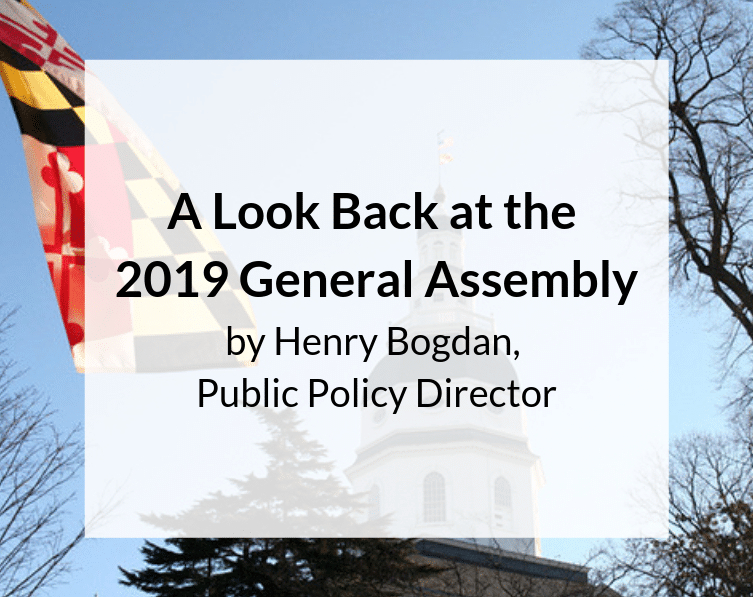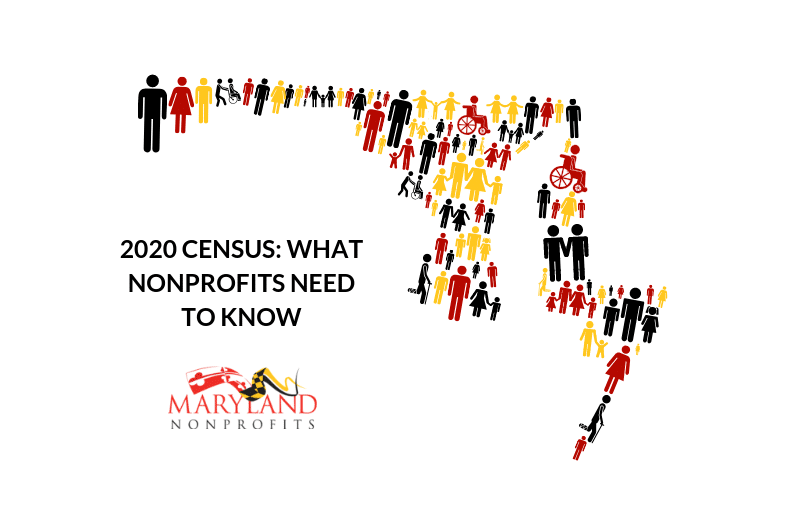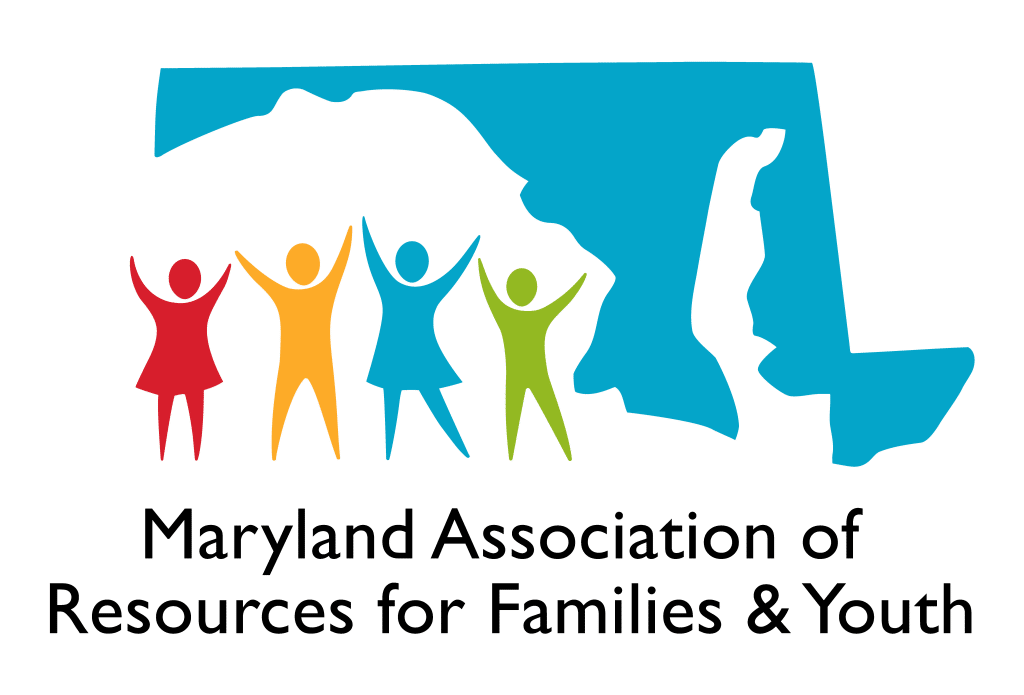There were numerous positive outcomes and achievements during the 2019 Legislative Session. One lasting memory of the 2019 General Assembly will be sorrowful: the passing of Speaker Michael Busch just one day before Sine Die. The mood at Sine Die’s adjournment was somber, not celebratory.
In contrast, on May 1, Delegate Adrienne Jones of Baltimore County was elected to be the new Speaker of the House of Delegates, giving us much to celebrate as she becomes the first woman and first African-American elected to lead either house of Maryland’s General Assembly.
The budget for the coming year, FY 2020, was balanced with relatively little pain. However, out-year deficits are still projected and funding must be found for the implementation of the Kirwan Commission’s recommendations. Please contact us if you would be interested in working to increase state revenues to avoid possible funding cuts to existing programs. See the 90-Day Report by the Department of Legislative Services for a fully detailed fiscal and policy review.
There were major successes on several of Maryland Nonprofits’ priority issues, as well as on other bills we supported. We worked in coalition with different advocates, and supported efforts led by others on these issues. Where we took the lead and succeeded, that was possible only with the assistance and support of many advocacy partners.
Two major health-related measures we supported were passed, and both took effect without the Governor’s signature. Even in their amended forms they represent significant progress.
- HB 768 will establish a Prescription Drug Affordability Board, the first in the nation, with power to make the pharmaceutical industry justify pricing, if only for purchase under state and local government employee coverages.
- Thanks to HB 814 and SB 802, Maryland will also be the first state to have a health insurance enrollment option linked with its state income tax system. The Maryland Easy Enrollment Health Insurance Program will give people who are uninsured the option to see their costs and apply for coverage through a link between the tax system itself and the Health Benefit Exchange.
The Clean Energy Jobs Act, SB 516, enacted and signed by the Governor, requires the state’s electric utilities to acquire at least half of their energy from “Tier 1” renewable sources by 2030, includes increasing sub-goals for use of wind and solar generation, and sets requirements and standards for future solar- and wind- energy developments.
The Fight for Fifteen, HB 166 and SB 280), succeeded and the Governor’s veto was overridden. Unlike the last minimum wage increase, these bills provide for reimbursement adjustments for most service providers, although these are higher for some services than others. This was an important amendment requested by many nonprofits supporting the minimum wage increase – including Maryland Nonprofits.
The most anticipated question of the session, the fate of the Kirwan Commission’s recommendations to reform K-12 public education, got a positive response with the passage of the Blueprint for Maryland’s Future, SB 1030. Discussed below, this was a major priority for many nonprofits. A special workgroup has been appointed by the presiding officers to recommend changes in the education funding formulas to the 2020 General Assembly.
A major initiative Maryland Nonprofits and several advocacy partners put forward, was a study to improve transportation access to employment, health care and other critical human services, for those without public transit or private vehicle options. The House version of the legislation, HB 923, passed on sine die. If your organization serves people who face challenges when reaching your services or employment, please contact Henry Bogdan. We are looking for your stories and suggestions to prepare for the launch of the Task Force created for this study.
Policy Successes Reported by Advocacy Partners
Preservation MD/Smart Growth Maryland
-
- Creation of the Task Force to Study Transportation Access – HB 923.
- SB 269 and HB 428, broadening the purposes and authority of the Comprehensive Flood Management Grant Program to allow the MD Dept. of the Environment to make grants to political subdivisions to repair or correct major infrastructure damage done by significant flooding events, and mandating future appropriations to this grant program.
- The Opportunity Zone Enhancement Program established under SB 581 that encourages the adaptive reuse of buildings through the changes it makes to the Historic Tax Credit and also extends certain tax credits to support development in growth areas.
Maryland Family Network
-
- SB 1030 “The Blueprint for Maryland’s Future” endorses the sweeping policy recommendations of the Commission on Innovation and Excellence in Education—better known as the Kirwan Commission—and requires a 3-year “down-payment” on the implementation of those recommendations, totaling approximately $1 billion. State funding for pre-kindergarten will expand by $31.7 in FY 2020 and an estimated $53.6 million in FY 2021.
- HB 810 expands, for the first time in nearly 20 years, Maryland’s Child and Dependent Care Tax Credit—increasing the income threshold from $50,000 to $143,000 for married couples (and to $92,000 for individuals), indexing these limits annually for inflation, and making the credit refundable for low-income filers.
- HB 248/SB 181 built on landmark legislation from 2018 to give parents access to quality care. This legislation accelerates a mandated increase of childcare subsidy rates: beginning in July 2020, subsidy rates must equal or exceed 60-percent of market rates and must remain at or above the 60th percentile in the future.
Associated Black Charities
Held a Racial Equity Institute for Policymakers on January 15 in which 35 members of the General Assembly participated. During the course of the day, 3 sessions were held (one primary session and two auxiliaries). Policymakers had the opportunity to:
- Hear how two of their peers (Del. Geraldine Valentino-Smith and Del. Jazz Lewis) used Associated Black Charities’ “Policy Applications of a Racial Equity Lens: Ten Essential Questions for Policy Development, Evaluation, and Review” in legislation they sponsored.
- Learn more about the history and economic/social impacts of racialized policies in Maryland.
- Explore how the use of a racial equity lens can create more effective policies that strengthen the economic viability of Maryland.
CASH Campaign of Maryland
-
- HB 1411 mandates future appropriations to provide the CASH Campaign with a $200,000 state grant to expand its free tax preparation and EITC outreach efforts, to make sure all Marylanders who qualify for the EITC actually claim it. Research shows that for every $1 spent on free tax preparation, $127 is generated in economic activity in the local economy. The enacted budget and reconciliation bills include a similar grant for FY 2020.
- HB 1283 / SB 0732 authorize a local department of social services with guardianship over a child in need of assistance to have control over the property of the child for the purpose of establishing a “Achieving a Better Life Experience” or “ABLE” account on behalf of the child, and removes the requirement to seek and obtain an enabling court-order for each child’s account.
The CASH Campaign also worked with others urging the IRS to ‘forgive’ various penalties taxpayers might incur from not properly withholding throughout the 2018 year due to the effects of changes in the December 2017 federal tax bill. The IRS responded to this effort and is waiving penalties for many whose tax withholding and estimated tax payments fell short in 2018. Read the IRS press release here.
Community Development Network
HB 557 / SB 509 championed by the Community Development Network as part of a multi-year effort to reform and improve the Tax Sale process, enable local governments, by legislation, to establish a process to withhold tax delinquent vacant lots or vacant and abandoned structures from traditional tax sales, and instead to proceed (“in rem”) against the property itself in a foreclosure action auction sale. This may allow local authorities to reduce the time these properties remain as blighting influences by facilitating a faster sale to a private party, or the government to take possession.
Greater Baltimore Cultural Alliance
-
- GBCA supported Maryland Citizens for the Arts (MCA) and advocates across the state championing increased funding for the Maryland State Arts Council (MSAC) for FY20. Working with the Governor, his administration and the Maryland General Assembly, they secured a record $24.4 million appropriations for MSAC.
- GBCA also worked with MCA, and in conjunction with all 24 local MD arts council jurisdictions, to host one of the largest single-issue advocacy events in Annapolis on Maryland Arts Day, February 14, and hosted over 600 advocates from across the State.
League of Women Voters of Maryland
Working in collaboration with various partners and coalitions, LWV’s of MD supported successful legislative efforts that included:
- Fight for Fifteen (HB 166 and SB 280) successfully raising the minimum wage
- Passing the Clean Energy Jobs Act, SB 516
- Legislation enacted to implement voter registration on Election Day, SB 286 (authorized last November by voter approval of a constitutional amendment).
MCASA (Maryland Coalition Against Sexual Assault)
-
- The ‘Workplace Harassment’ bill, HB 679 / SB 872, puts in place major statutory reforms that will empower thousands of victims of sexual harassment in the workplace.
- SB 657 / HB 1249, passed with the leadership of Senator Nancy King and Delegate Kirill Reznik, establish a pilot program to assure that rape victims have adequate post-exposure treatment to prevent HIV infection.
- Under a package of bills, SB 767/HB 1096 and SB 569 / HB 1268, testing of rape evidence collection kits will become mandatory in Maryland except under very limited circumstances, and a “Rape Kit Testing Grant Fund” is established to provide the resources necessary to assure that testing is done, and in a timely manner. Senators Will Smith and Sarah Elfreth led the charge in the Senate, and Delegate Shelly Hettleman sponsored House bills.
Other Legislation We Supported
HB 365 and SB 17 – Clarified the application of last year’s legislation allowing nonprofits to recover indirect costs, to existing multi-year grants or contracts. Enacted
HB 461 and SB 400 – Strengthened the criteria for the Maryland Higher Education Commission to approve institutions as “private nonprofit institutions of higher education”. Enacted
HB 341 and SB 500 – The “Time to Care Act” establishing a family- and medical- paid leave insurance program. Failed
HB 320 and SB 455 – Would have established a 2020 Complete Count Commission to coordinate and assure efforts across the state. Failed
HB 366 and SB 982 – Would have created a Commission to study funding of “non-emergency medical transportation,” particularly for dialysis patients. Failed (also an object of House Bill 923 above)
HB 584 and SB 263 – Would expand the State earned income tax credits for individuals without qualifying children by increasing the income thresholds at which the credits phase out and making the credits fully refundable. Failed
HB 585 and SB 262 – Would expand the State earned income tax credit for individuals without qualifying children by increasing the percentage value of the credit and making the credit fully refundable. Failed
HB 1108 and SB 990 – Proposed a state constitutional amendment to allow the legislature to add or increase items in the executive branch budget, that do not increase the overall appropriation level in the Budget Bill. Failed
HB 1287 and SB 632 – Would establish a funding source for the Community Development Program Fund (created by 2018 legislation) by dedicating the excess receipts in the abandoned property fund, after distributing of $80 million to the state’s general fund. Failed
SB 450 – Would mandate future appropriations for the Office of the Attorney General, equal to at least the amount appropriated in fiscal 2018, plus amounts needed to administer the Maryland Defense Act of 2017 and the Financial Consumer Protection Act of 2018, and any amount received from settlements where the Attorney General represented the State. Failed
SB 929 – Would have ‘de-coupled’ Maryland from a federal tax change that imposes tax (as ‘unrelated business income’) on amounts nonprofits spend to provide certain commuting benefits to their employees. Bill withdrawn before hearing.
Legislation We Opposed
HB 846 and SB 482 – Would have shifted Medicaid funding of behavioral health services to administration through MCO’s (managed care organizations) rather than the current (‘carve out’) specialty mental health system of community providers, jeopardizing treatment for patients not in Medicaid and the coordination among high-risk populations, and possibly diverting resources to administration. Withdrawn






